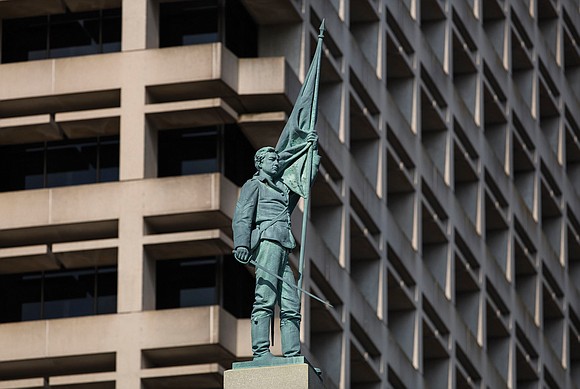Prosecutors: Norfolk can move Confederate monument
Sarah Rankin/The Associated Press | 10/25/2019, 6 a.m.

Norfolk can relocate a Confederate monument despite a state law barring the removal of war memorials, the city’s top prosecutor and the state’s attorney general argued in a lawsuit.
The two filed a motion Tuesday seeking to dismiss a city lawsuit filed against them that states the law infringes on its right to free speech. Norfolk Commonwealth’s Attorney Greg Underwood and Virginia Attorney General Mark R. Herring said in court documents that they don’t believe the law applies to the 80-foot monument in Norfolk’s downtown and that they wouldn’t try to enforce it.
All parties “agree that the City may remove the Monument,” said the motion, which also notes that Mr. Underwood and Mr. Herring support its removal.
The filing marks the latest development in a series of legal fights and other efforts around the state to remove or relocate memorials to Confederate leaders or other symbols of the old South. The long-running debate gained new momentum after a white nationalist rally in Charlottesville two years ago descended into violence and a car attack left a woman dead and dozens hurt.
What happens next with Norfolk’s monument, which includes a statue of a Confederate soldier nicknamed “Johnny Reb” as well as the seal of the former Confederacy, wasn’t immediately clear on Wednesday.
Norfolk City Attorney Adam Melita said his office was reviewing the filings and “we really do not have any comment for the public at this time.”
University of Virginia law professor Richard Schragger, whose work includes a focus on the intersection of constitutional law and local government law, said he didn’t think it was entirely clear that the city could proceed with removing the monument.
The state law at issue has a provision allowing private parties to enforce it, meaning removing the monument could open the city up to lawsuits by outside groups, Mr. Schragger said.
The 1904 law that makes it unlawful to “disturb or interfere with” memorials for war veterans initially applied only to counties but was expanded to include all localities in 1997. In 2017, Mr. Herring issued an opinion that said the law didn’t apply retroactively to statues erected before the law’s expansion.
The Norfolk monument, which the City Council voted to move to a cemetery, went up in 1907.
Virginia has more Confederate monuments on public property than any other state but Georgia, according to a survey by the Southern Poverty Law Center.






